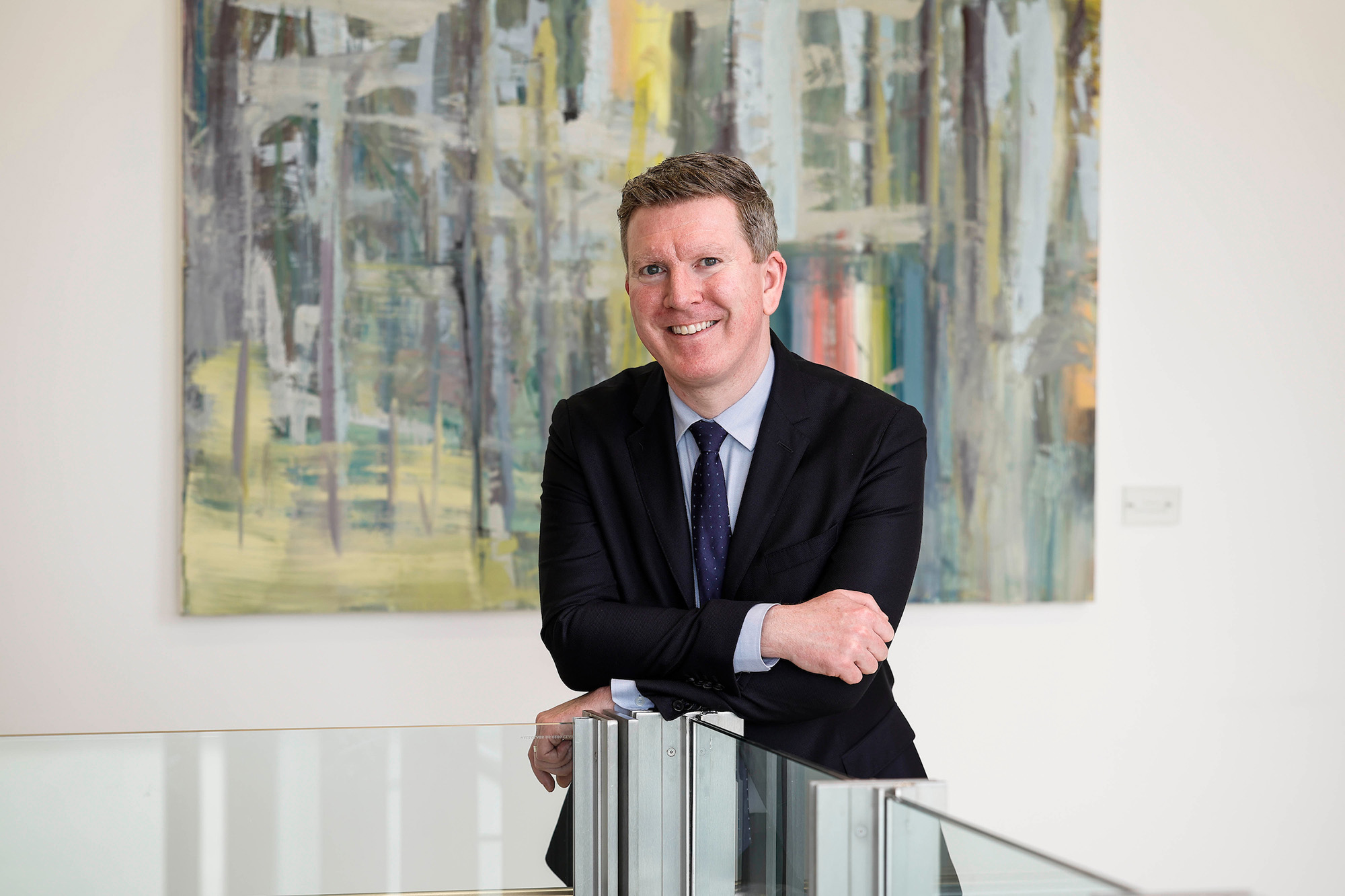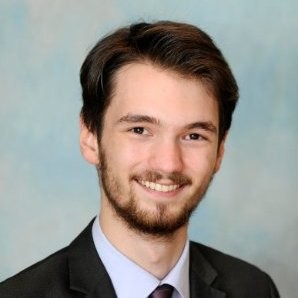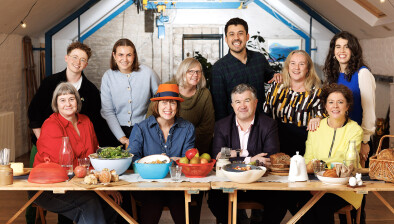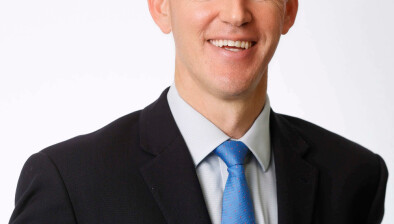Rob McDwyer: From Ireland to Australia and back

Pictured: Rob McDwyer, partner at Mason Hayes & Curran LLP
When Rob McDwyer describes moving to Australia as a Dublin solicitor with just over a decade of experience under his belt, he manages to make a career-defining move sound like something of a whim.
Encouraged by a handful of friends and acquaintances to follow them in making the leap, he decided to apply for a year-long working holiday visa “and see what it’s like over there” — but, on returning to Ireland, found that his mind was preoccupied with Sydney and a more permanent relocation had become inevitable. Thus began a nearly decade-and-a-half legal career down under, where Mr McDwyer discovered a passion for renewable energy that he has brought back to Ireland in his new role as a partner in Mason Hayes & Curran LLP.
As a fresh-faced graduate of University College Dublin, Mr McDwyer began his legal career at Reddy Charlton McKnight (now Reddy Charlton) in the late 1990s. It was “a very different time, where I was down in my office in the basement smoking away while on the phone… and writing on a black screen with green text,” he recalls. His first experience of corporate law was working under Paul Keane, who left an indelible impression on a young Mr McDwyer. “I would class him as one of the best corporate lawyers around,” he says. “It was really, really lovely to get working with him… he gave me the grounding to become the corporate lawyer I ended up being.”
When Mr McDwyer eventually left for Australian shores, it was as a result of a job advert placed in Ireland by one of Australia’s top law firms, Gilbert + Tobin. “I think a lot of people had gone over to London and they hadn’t been able to get people within the Australian market,” he explains. “They were looking at the UK and Ireland because they’re common law jurisdictions as well, and for corporate lawyers, the skills are very transferable.” For Mr McDwyer, it was serendipity.
It was while working at Gilbert + Tobin that Mr McDwyer was seconded to Infigen Energy, one of Australia’s leading renewable energy companies, which he was eventually invited to join full-time. “I didn’t have to think about it for too long, because I really, really enjoyed working in the area of renewables and I was enjoying the work and the change from private practice,” he says.
It was also “probably the best way to leave a law firm”, Mr McDwyer jokes. “Since you’re leaving to go to one of their clients, you get lots of farewell lunches and people patting you on the back. There was no frowning or suggestion that I be put on gardening leave or anything like that… It was all on very good terms.” He joined Infigen (now known as Iberdrola Australia) as senior legal and business counsel, later taking up a role as deputy general counsel.
Just a few years after a tectonic move from Ireland to Australia, Mr McDwyer was in the process of making another shift from private practice to in-house practice. “You’re totally immersed in the business when you’re in-house,” he says of the change. “You’re more than just a lawyer — you have to have your business hat on as well. You have to appreciate that businesses are more willing to take on risks than you as a lawyer might be, and you have to work with them on that.”
More than anything else, Mr McDwyer’s time at Infigen/Iberdrola instilled in him a passion for renewable energy. “You’re working with people who are really so driven and so passionate about it, it rubs off on you,” he says. “I used to enjoy answering the question ‘what do you do?’ with ‘I work in renewables’. It didn’t tend to shut down conversations in the way ‘I’m a lawyer’ did.”
It was the pandemic that finally persuaded Mr McDwyer and his wife Hazel — both, by then, having acquired Australian citizenship — to return to Ireland to be closer to family.
In May this year, after a short stint with another major Irish firm, Mr McDwyer joined Mason Hayes & Curran as a partner in its construction, infrastructure and utilities department, specialising in energy law. Hazel had joined the firm as an intellectual property partner just over a year earlier.
He says he is settling in well and enjoying the opportunity to re-focus on renewables.
As well as working on large-scale corporate power purchase agreements (including a particularly interesting cross-border agreement between a wind farm north of the border and a buyer in the south), a major focus for Mr McDwyer are the offshore wind auctions taking place under the Irish government’s new offshore renewable electricity support scheme (ORESS), which ministers hope will make a major contribution to Ireland meeting its 2030 climate targets.
The four successful projects in the ORESS 1 auction will generate three gigawatts of electricity, and the ORESS 2.1 auction later this year will lead to a 900 megawatt development off the south coast of Ireland. A further auction focusing on the east coast will take place next year. Altogether, the auctions are aimed at delivering over five gigawatts of offshore wind energy by 2030 — though, as Mr McDwyer points out, this is easier said than done.
“The backlogs in planning are a real issue, and one of the other big issues is the fact that everything seems to get judicially reviewed in Ireland,” he says. “If you have a renewable energy project, you have to expect there’ll be at least one judicial review during the course of its development, and those are processes that can take up to 18 months.” He acknowledges the government has tabled new legislation, in the form of the Planning and Development Bill, to address this, but sounds unconvinced it will have the necessary impact.
Not all of the challenges, he adds, are Ireland’s alone. There remain significant international supply chain issues, and moves by the Biden administration to massively invest in renewable energy as part of the US president’s flagship Inflation Reduction Act will see Irish projects “battling with the Americans and globally” for manufacturing and transport capacity.
Does Mr McDwyer think Ireland will meet its 2030 renewables targets? “Realistically, I think it’s going to be a real stretch,” he admits — though he appreciates the government “is doing a lot” to make it happen. He suggests projects will likely be well under construction by 2030, but not complete. There will, certainly, be plenty of work for energy lawyers over the coming years.
With the unique vantage point of having worked across two jurisdictions a hemisphere apart, with lengthy periods in private practice and in-house practice, Mr McDwyer is full of advice for younger lawyers trying to decide where to build their careers. His first and most important tip: don’t rush.
“Don’t go in-house until you’ve built up a few years of experience in private practice,” he warns. “The legal team — if there is one — won’t be able to give you the training and experience that you would get in a law firm. You’re much better off building up good experience for a few years and then you’ll be able to make the move in-house. You’ll be a lot more useful to the business too.
“I would also make a similar point if you were thinking of going overseas to somewhere like Australia. I wouldn’t recommend doing that until you’ve built up a few years of experience as well.” More experience at home typically expedites the process of qualifying in another jurisdiction, he notes.
Mr McDwyer doesn’t see his return to Ireland as closing the door on his relationship with Australia. “My wife and I both really love Australia and I can see ourselves spending a lot of time back there in the years to come,” he says, especially when retirement calls. But for now, he is focused on putting into practice everything he’s learned in the course of a remarkably varied legal career.











